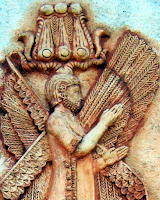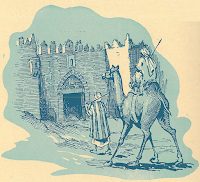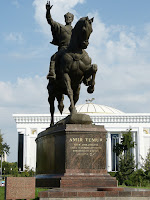There is hardly anyone yet able to correctly describe the greatest ruler of all time, but there are at least 5 rulers in history who were truly considered as one of the greatest rulers of all time. These five rulers were not only able to conquer and rule most of the known world of his time but their rule was also marked as an unprecedented political, economical, and cultural success besides their administrative and military capabilities was unmatched. Cyrus the Great, Alexander the Great, Umar the Great, Genghis (Temujin) Khan the Great, and Tamerlane (Timur) the Great; these 5 military leaders truly earned the reputation as the greatest rulers in history.
These rulers were selected based on the criteria mentioned below:
(1) Their rules were marked as an unparalleled Political, Social, and Economical apex.
(2) Administrative and Military accomplishments were vast.
(3) They conquered and ruled over much of the known world and build their empire's foundations towards glory.
Cyrus the Great:
Cyrus the Great (600-530 BC), was the founder of the greatest and largest ancient empire in history known as the Achaemenid Empire. As an undefeated commander, he conquered Median Empire, Lydian Empire, and Neo-Babylonian Empire besides also successfully occupied most of Central Asia and parts of South Asia. Cyrus was the brilliant administrator and military strategist who for the first time personally led the administrative principals of the multi-state empire based on the satrap system and highly organized army including the Immortals unit, composed of 10,000 highly trained soldiers. Cyrus conquest started a new era of the age of empires or global empires, where a huge number of superstates (comprised of different countries, races, religions, and languages) were governed by a central government. He conquered and ruled almost half of the known world and under his son (Cambyses I) and grandson (Darius the Great) his empire further expand and reaches the height of glory, stretching from northern Sudan to Pakistan and from parts of Ukraine or Russia to Qatar or Oman. His empire dominated most of the known world for two centuries as the first global empire (or superpower of the world).
Alexander the Great:
Alexander the Great (356-323 BC), was a king of the ancient Greek kingdom called Macedon. He succeeded his father, King Philip II, at the age of 20. He spent most of his ruling life on constant military campaigns across Egypt, Balkans, and over most of known Asia, eventually stretching his kingdom from the Adriatic sea to the Indus river before his death. Moreover, he is also widely regarded as an undefeated military commander in dozens of battles against outnumbered enemies. Apart from his military prowess and geniuses, his legacy also brought Greek culture to the east resulted in the creation of Hellenistic civilization over much of Asia. He conquered and ruled almost half of the known world. His empire fragmented after his death.
Umar ibn Al-Khattab:
Umar ibn Al-Khattab (584-644 AD), also known as Umar the Great, was one of the most powerful Muslim caliphs in history. He was one of the top companions of the prophet Muhammad (صلى الله عليه و سلم), succeeded Abu Bakr as the second Rashidun caliph on 23 August 634. He is an expert jurist and brilliant orator, these qualities not only able him to became a refine statesmen but also help him administratively. His administrative skills were unprecedented which set the foundations of the Islamic system of the Rashidun caliphate. Later, Umayyad and Abbasid caliphate also follow this political and socio-economic model developed by Umar ibn Al-Khattab, even his administrative influence reaches the present era where it was followed by every developed nation (in the form of child benefits and pension plans for the children and the elderly people, respectively). Moreover, his administrative reforms set the political structure that would hold together his huge territory from the parts of northern Africa to the parts of Central Asia. Along with Khalid bin Al-Walid, Umar was also a brilliant strategist; he not only successfully split the Byzantine-Sassanid alliance in 636 but made an unexpected flanking movement and laid siege to Emesa (Homs) at the second Battle of Emesa in 638, other than that he also launches a full-scale invasion of Sassanid Persian Empire in a well-coordinated manner with multi-pronged attacks; designed to isolate and destroy their targets. Under 10 years of his reign, the Muslim armies conquered the entire Sassanian Empire and two-third of the entire Byzantine Empire. Before his death, he ruled over 20% of the known earth.
Genghis Khan:
Genghis Khan (birth name Temujin, 1162-1227 AD), was the founder and first Great Khan of the Mongol Empire. After the unification of nomadic tribes in Northeast Asia, Temujin proclaimed Genghis Khan (Oceanic Ruler). Military campaigns started in his life leads to the conquest of much of the Jin and Khawarazmian Empire and even the entirety of the Western Xia Empire and Qara Khitai Khanate. Together with his military brilliance, his administrative intellect also set the future state of his empire without any succession problems for decades. He is also credited with bringing the Silk Road under one cohesive political environment. He ruled over almost one-quarter of the known earth.
Timur Beg:
Timur (1336-1405 AD), known by his western pejorative name as Tamerlane derived from the Persian word Timur the Lame because he sustained an injury from arrows (one in his leg and second in his right shoulder and hand) causing him lame. He was the founder of the Timurid Empire and the Timurid Dynasty in and around modern-day Iran and Central Asia. Despite his physical handicaps, he remained an undefeated military commander in over 40 years (1363-1403) of his constant wars, conquered 17 million km2 landmass of the entire earth, and in the process, 17 million people had also died from his conquest (5% of the total world's population at that time). Timur belonged to the Barlas tribe of Tartar origin. His unceasingly military campaigns across Eurasia brought immeasurable military accomplishments. Under his reign/command, the invincible Timurid hordes defeated or subdued every single great empire of his time; the Turkish Ottoman Sultanate, Egyptian Mamluk Sultanate, Grand Duchy of Lithuania, Dehli Sultanate of India, and all the remnants of the former Mongol Empire i.e. Chagatai Khanate of Turkistan, Ilkhanate of Persia, Golden Horde Khanate of Russia and even the Northern Yuan Khanate of Mongolia except the Ming dynasty of China, which escaped because of Timur's death from fever while he had already headed towards this last great empire. His administrative achievements were also vast, which can be described by Spanish ambassador Rey Gonzalez the Clavijo in an account of his journey towards Timur's capital, Samarkand. Likewise, his sophisticated diplomacy carried the archives from Spain or France on the west to China on the east. Furthermore, his excellent diplomacy together with his military prowesses made him an absolute leader of Mawarannahr before his rise to power (1370). Timur is also a great patron of the arts and sciences. Under his reign and their descendants; education was greatly flourished in almost every field such as Astronomy, Mathematics, Arts, and Social Sciences, eventually gave birth to Timurid Renaissance. His empire covers every aspect of glory; cultural, political, military, administrative, and socio-economic achievements. He conquered 1/3 of the known earth of his time and ruled over half of the known world. Unlike Cyrus, Alexander, Umar, and Temujin (Genghis Khan), he started his Timurid Empire from the grassroots level to encompasses the entire regions from the Adriatic sea to the far eastern Siberia on the one hand and from Northern Sudan to Western China on the other hand. Undeniably, he is the greatest conqueror, military campaigner, and commander of all time, perhaps maybe the Greatest Ruler as well. An inscription was written over his tombstone by his grandson Ulugh Beg (Great Leader) to testify this monarch in the following words, "This is the resting place of the illustrious and merciful monarch, the most great Sultan, the most mighty warrior, Lord Timur, Conqueror of the World".




